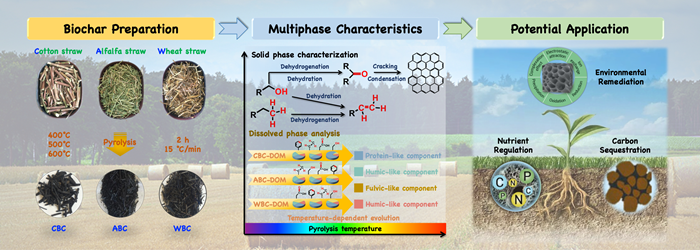The Study on Sustainable Exploitation and Safe Utilization of Crop Residue Biochar
Recently, the multiphase (solid and dissolved) structure and potential hazards of crop residue biochar (BC) were systematically investigated by the Heavy Metal Ecotoxicology and Pollution Remediation Innovation Team of Agro-Environmental Protection Institute, Ministry of Agriculture and Rural Affairs. This study will hopefully offer comprehensive guidance for sustainable utilization of crop straw and fit-for-purpose exploitation of BC.
Pyrolysis temperature is one of the key factors affecting the physicochemical properties of BC. However, the quantitative relationship between pyrolysis temperature and surface properties (functional groups and the carbonization degree) of BC remains unexplored. The temperature-dependent evolution mechanism of functional groups in dissolved organic matter derived from BC is unclear. Furthermore, the systematic analysis of potential hazards in BC is a precondition for safe application of BC.
Pyrolysis temperature determines the multiphase properties of BC and ultimately affects its application. Although the amount of potentially toxic elements (PTEs) in BC was concentrated after pyrolysis, the potential risk of PTEs significantly decreased. The spin concentration of persistent free radicals (PFRs) in BC prepared at 500 ℃ was the highest. The BC prepared at 400 ℃ exhibited abundant nitrogen content and functional groups, which could be applied for soil nutrient regulation. The BC produced at 500 ℃ had developed pore structures and high PFRs content, rendering it suitable for adsorbing and/or eliminating pollutant. The BC pyrolyzed at 600 ℃ possessed high carbon content, stability, and aromaticity, contributing to achieve carbon sequestration.

This work was supported by the National Natural Science Foundation of China (31971525), the National Key Research and Development Program of China (2018YFD0800300).
Author: Yuebing Sun, Tao Sun
-
 Apr 18, 2024Opening Ceremony of the Training Workshop on Wheat Head Scab Resistance Breeding and Pest Control in Africa Held in CAAS
Apr 18, 2024Opening Ceremony of the Training Workshop on Wheat Head Scab Resistance Breeding and Pest Control in Africa Held in CAAS -
 Apr 03, 2024IPPCAAS Co-organized the Training Workshop on Management and Application of Biopesticides in Nepal
Apr 03, 2024IPPCAAS Co-organized the Training Workshop on Management and Application of Biopesticides in Nepal -
 Mar 28, 2024Delegation from the School of Agriculture and Food Science of University College Dublin, Ireland Visit to IAS, CAAS
Mar 28, 2024Delegation from the School of Agriculture and Food Science of University College Dublin, Ireland Visit to IAS, CAAS -
 Mar 25, 2024Director of World Food Prize Foundation visited GSCAAS
Mar 25, 2024Director of World Food Prize Foundation visited GSCAAS -
 Mar 20, 2024Institute of Crop Sciences (ICS) and Syngenta Group Global Seeds Advance Collaborative Research in the Seed Industry
Mar 20, 2024Institute of Crop Sciences (ICS) and Syngenta Group Global Seeds Advance Collaborative Research in the Seed Industry
